What Should You Check Before Choosing a Firearm for Hunting?
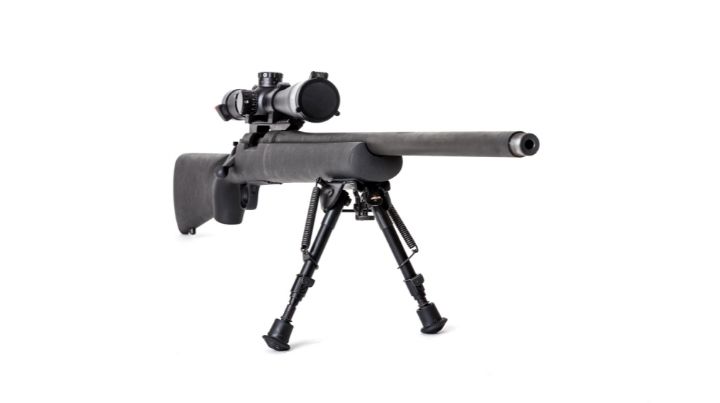
Are you thinking about hunting and wondering what should you check before choosing a firearm for hunting?
Choosing the right firearm for hunting can be difficult. There are many factors to consider, such as knowledge and ability, hunting preferences, and budget.
That’s why I’ve put together this guide on what should you check before choosing a firearm for hunting. With this article’s help, you’ll be able to make a more well-informed decision and select the perfect gun for your next hunt.
Read our guide on what you should check before choosing a firearm for hunting now!
Know the Basics of Firearms & Hunting
Before heading out on your hunt, you must know the basics of firearms safety and hunting. Understanding the safe use of firearms will help keep you and others safe. Likewise, knowing the basics of hunting will help ensure you do right by the animals that you intend to hunt.
Know the Four Rules of Firearm Safety
Firearm safety is an essential topic that every gun owner should be familiar with.
Four basic rules of firearm safety:
- Always keep the gun pointed in a safe direction
- Always keep your finger off the trigger until you’re ready to shoot
- Always keep the gun unloaded until you’re ready to use it
- know your target and what’s beyond it.
By following these simple safe-handling guidelines, you can help to prevent “negligent” shootings.
Accidental vs. Negligent Shootings
People are injured and killed in “accidental” shootings every year. And, in my opinion, there is no such thing as an “accidental” shooting.
If a person follows the four rules of firearms safety, no one will get shot. Instead, “accidental” shootings should be considered “negligent” shootings.
After all, if a person doesn’t follow the basic rules of firearms safety or doesn’t work to learn them before handling a firearm, that person is negligent in their responsibility.
Storing and Transporting Firearms
In addition to living by the four rules of firearms safety, it’s also essential to know the regulations and best practices for storing and transporting firearms. By understanding the regulations, you will avoid running afoul of law enforcement. And by implementing best practices about firearm storage, you’ll prevent unnecessary damage to your gun.
By taking the time to familiarize yourself with the basic rules of firearm safety, you can help to ensure that everyone remains safe when guns are present.
Have Hunting Education

Hunter’s education is a Hunter’s Ed class or course that helps educate new and experienced hunters on the importance of safety, ethics, and conservation when hunting. Taking a Hunter’s Ed class is usually a requirement to get a hunting license in most states.
Hunter’s education teaches Hunter Ed students about the dangers of mishandling firearms and not following basic safety protocols while hunting. It also teaches important topics such as hunter ethics, identifying different animal tracks, and respecting private property boundaries. Hunter Ed also goes over the legal aspects of hunting and teaches students about local, state, and federal regulations.
In addition, many Hunter's Ed courses now include a strong emphasis on conservation. Hunters learn the importance of being good stewards of the land and wildlife resources.
In some states, Hunters Ed is even required for bowhunters.
Whether you are a first-time hunter or an experienced hunter, taking a Hunter’s Ed course is always good. Not only will you learn valuable information that can help keep you safe while hunting, but you will also show your commitment to being a responsible hunter.
What Factors Should You Consider When Choosing a Firearm for Hunting?
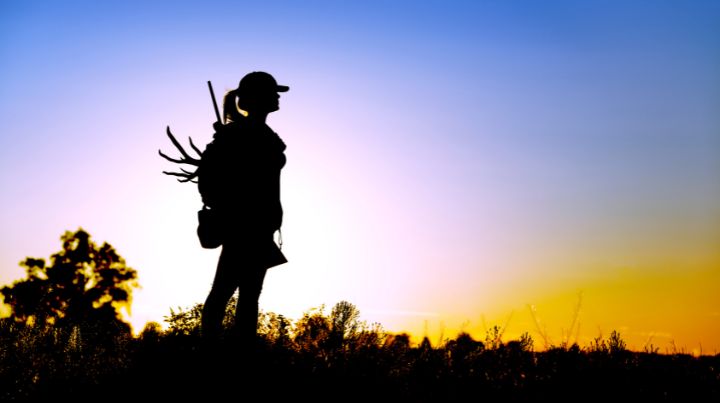
When choosing a firearm for hunting, there are a few crucial factors to consider.
1. Consider Your Ability
You must be knowledgeable in your chosen firearm and capable. Do you have the strength to manage your rifle weight? What are your personal preferences?
2. Think About Your Situation
What type of game will you be hunting? Smaller animals like squirrels or rabbits can be easily taken down with a .22 caliber rifle, while larger animals like whitetail deer require a more powerful weapon.
3. Where Do You Plan to Hunt?
Third, you need to consider the range you will be shooting. If you plan on taking long-distance shots, you will need the good long-range accuracy a scope provides.
4. What is Your Budget?
Hunting rifles can be pretty expensive, so it is vital to set a realistic budget before making your purchase.
By considering all of these factors, you can be sure to choose the right firearm for your next hunting trip.
Know Your Hunting Firearm Laws and Legal Requirements
Firearm laws and safety regulations vary from state to state, so it’s an important consideration to know the rules in the state where you’ll be hunting. Ignorance of the law is not an excuse, and you could be fined or even jailed if you break the law. Not only may you be fined and jailed, but if your offense is serious enough in the eyes of the law, you could lose your ability to possess firearms forever. So, be smart about knowing the rules and regulations.
In addition to knowing the firearm laws, you also need to be familiar with the game hunting regulations. These regulations specify the days and times when hunting is allowed and the types of animals that you can hunt. The regulations also establish minimum age requirements for hunters and limit how many animals can be killed.
By following the firearm laws and hunting regulations, you can help to ensure a safe and enjoyable hunting experience for everyone involved.
What Should You Check to Make Sure the Firearm Is Safe to Use?
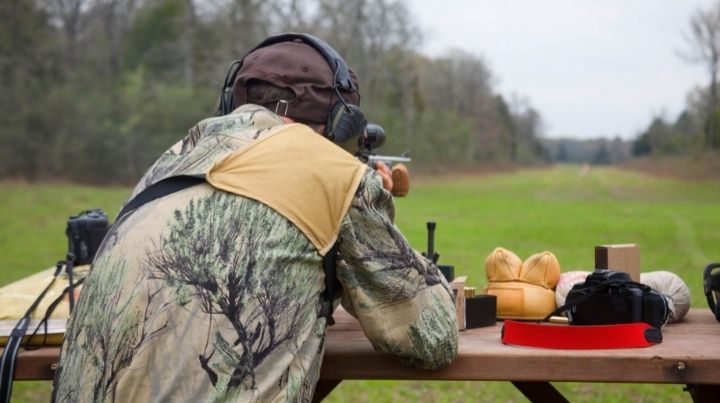
Before you start hunting, you should check some critical things to ensure the hunting firearm is safe.
Six critical things to check before hunting are: You, the Action, the Barrel, the Stock, and the Sights.
Step 1: Check Yourself
Are you in the right mindset to safely handle a firearm? If not, walk away and come back to your hunting guns when you can safely work with your firearm.
Step 2: Check That the Firearm Is Unloaded
Hunting guns can be deadly. Therefore, hunters must always check that their gun is not loaded before handling it. Every year, there are reports of hunters being injured or killed by a negligent discharge of their firearm.
In most cases, these accidents could have been easily prevented if the hunter had taken the time to check that their weapon was unloaded.
By taking a few seconds to confirm that the chamber is empty and there is no source of ammunition to feed a round into the gun, hunters can help ensure their safety and the safety of those around them.
Step 3: Check the Action
The action is critical because it’s what loads, locks, fires, and unloads the firearm. Make sure it’s operating smoothly and properly and is not obstructed. If you lube your hunting firearms, follow the manufacturer’s specifications. While checking the action, it’s also a good idea to confirm that the firing pin is intact and not damaged.
Step 4: Check the Barrel
Next, safely inspect the barrel to ensure there isn’t any rust, damage, or other obstructions that could cause problems.
Step 5: Check the Stock
The stock is the part of the rifle that rests against your shoulder, and it helps to support the weight of the gun. If the stock is not in good condition, it can be dangerous to you, very uncomfortable to shoot, and your accuracy can be significantly affected.
Before setting out with your firearm, be sure to inspect the stock to ensure it’s not cracked or broken. While checking the stock, if you have a recoil pad, check to see that it is firmly attached and not loose. Likewise, if you run with a sling, give that a good once over.
Step 6: Check Your Sights
Hunters need to have a keen eye and a steady hand to be successful. However, even the best marksmen will struggle if their rifle is not sighted correctly. Before heading out into the woods, it is essential to take the time to check the sights on your hunting guns. This simple task can differentiate between a successful hunt and coming home empty-handed.
Before the season starts, you should check that the sights on your rifle are accurate, on target, and adequately zeroed. You can do this by setting up a target and taking a few practice shots from a steady position.
If your shots are consistently off-target, then it is likely that your sights are not correctly aligned. You can adjust the sights yourself or take your rifle to a qualified gunsmith for help. With proper alignment, you will be able to hit your target with ease.
In addition to confirming your zero, you should physically inspect the sights of your hunting rifles before every hunting trip. Look for any signs of apparent damage or indications your sights may have been bumped out of proper sight alignment. If you notice any issues, do not use your rifle again until you’ve had a chance to reconfirm your alignment.
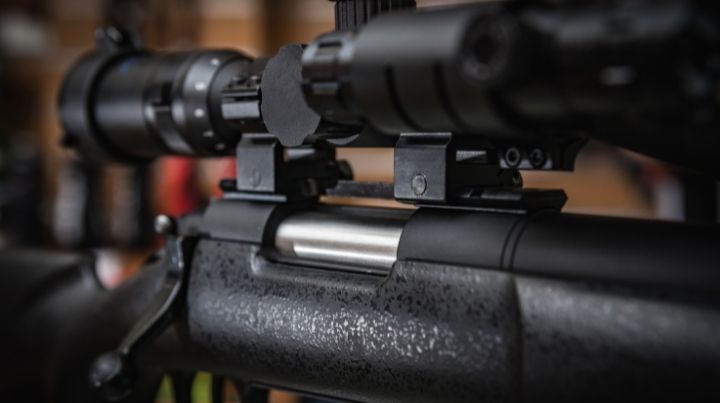
Checking the sights on your rifle may seem like a small detail, but it can significantly impact your hunting success. By ensuring that your rifle is sighted correctly, you can improve your chances of bringing game supper.
If you follow these six steps, your hunting firearm will be more likely to function safely and effectively the next time you get behind the sights.
How Do You Choose the Right Ammunition for Your Firearm?
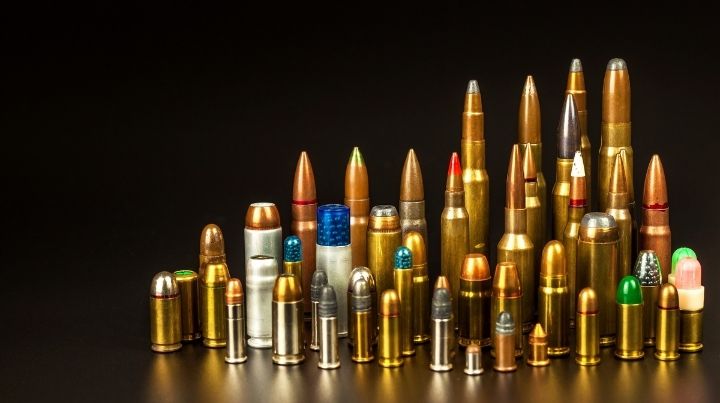
When choosing ammunition for your firearm, there are a few critical factors to consider.
1. Know Your Gun’s Type and Caliber
Make sure to choose the correct ammunition for your gun. So, if you have a rifle, make sure you have rifle ammunition. Likewise, if you have a shotgun, make sure you have shotgun ammunition.
You also need to choose the right caliber. Make sure the ammunition you have is the same caliber as your gun. While this may seem silly to an experienced gun owner, it’s not unheard of in the ranks of new gun owners.
2. Know the Local Laws
Ammunition laws vary from state to state. Therefore, before loading your rifle, check to see that the rounds you have follow local laws.
3. Know the Specifics of Your Hunting Situation
Do you know how far you’ll be shooting? What’s the foliage like where you plan to hunt? How does your ammunition behave in adverse conditions?
By considering these factors, you can be sure to choose the proper ammunition for your firearm.
What Should I Look For in a Hunting Rifle?

There are many factors to consider when choosing a hunting rifle.
One of the most important is the caliber or diameter of the bullet. The larger the caliber, the more powerful the rifle will be. However, this also means that the gun will be heavier and more challenging to carry.
Another factor to consider is the action type. There are three main types of hunting actions: bolt-action, lever-action, and pump-action. All are a single-shot firearm, meaning only one shot at a time. Bolt-action rifles are the most accurate, but they are also the slowest to reload. Lever-action rifles are faster to reload but less accurate. Pump-action rifles fall somewhere in between.
Finally, you will need to decide what type of sights you want on your rifle. There are three main choices: iron sights, scopes, and red dot sights. Iron sights are the simplest and most durable option, but they can be challenging to use in low-light conditions. Scopes provide a clear view of your target, but they can be bulky and expensive. Red dot sights are lightweight and easy to use, but they may not be as accurate as other types of sights.
With so many options to choose from, it is crucial to take your time and find the right hunting rifle for you.
The Bottom Line About What Should You Check Before Choosing a Firearm for Hunting
Whether someone is new to hunting or from the ranks of experienced big-game hunters, the fundamentals are the same for your hunting gear.
Before taking your best firearm to the woods, make sure you know how to use it safely. Likewise, consider your mindset, ability, and individual hunting situation. Do you have to correct ammunition? Have you checked to make sure your firearm is ready to go?
If you’ve satisfied all of those base requirements, you’ll be well on your way to having a safe and excellent hunting experience.
What are your thoughts about what you should check before choosing a firearm for hunting? Tell us in the comments below!
Additional Resources:
- Civilian Firearms Training and Mastering the Basics
- 10+ Best Hidden Gun Storage Ideas with VIDEOS! (2023)
- 7 Best Survival Bows for Hunting & Self-Defense (2022)
- 7 Best Survival Spears for Hunting and SHTF (2023)
Stay safe,

Related Articles
FREE Guide
Read the Best Seller
Join Mind4Survival
Stay informed by joining the Mind4Survival! 100% Secure! 0% Spam!
Affiliate Disclosure...
Mind4Survival is a free, reader-supported information resource. If you make a purchase through our link, we may, at no cost to you, receive an affiliate commission.
Do You Want To Be Ready No Matter What?

Download our free 39-page guide with interactive, 7-Day Emergency Kit Checklist and take the first step toward real preparedness.
- Know exactly where to start.
- Save time and money.
- How-to build a complete Basic Emergency Kit.
- Level up your safety and security.
Join Mind4Survival
Stay informed by joining the Mind4Survival! 100% Secure! 0% Spam!





